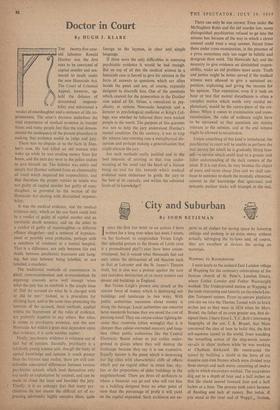Doctor in Court
By HUGH J. KLARE
THE twenty-five-year- old labourer Ronald Dunbar was the first man to be convicted of capital murder and sen- tenced to death under the new Homicide Act. The Court of Criminal Appeal, however, up- held the defence of diminished responsi- bility and substituted a verdict of manslaughter and a sentence of life im- prisonment. The court's decision underlines the vital importance of medical evidence in"murder trials; and many people feel that the trial demon- strated the inadequacy of the present procedure in making that evidence useful to judge and jury.
There was no dispute as to the facts in Dun- bar's case. He had killed an old- woman who woke up while he was stealing money from her home, and the next day went to the police station to give himself up. The defence was solely and simply that Dunbar suffered from an abnormality of mind which impaired his responsibility, and that therefore the proper verdict to return was not guilty of capital murder but guilty of man- slaughter, as provided by the section of the Homicide Act dealing with diminished responsi- bility.
It was the medical evidence, and the medical evidence only, which on the one hand could lead to a verdict of guilty of capital murder and an inevitable death sentence, and on the other to a verdict of guilty of manslaughter—a different offence altogether—and a sentence of imprison- ment or possibly even probation, perhaps with a condition of residence at a mental hospital. That is a difference, not only between life and death, between psychiatric treatment and hang- ing, but also between being labelled, or not labelled, a murderer.
The traditional methods of examination in chief, cross-examination and re-examination by opposing counsels serve well enough when what the jury has to establish is the simple issue of 'Did the accused do what he is charged with or did he not?' Indeed, as a procedure for eliciting facts, and at the same time protecting the interests of the accused, these methods, applied within the framework of the rules of evidence, are probably superior to any others. But when it comes to psychiatric evidence, and the new Homicide Act makes a great deal dependent upon that evidence, it is quite another matter.
Firstly, psychiatric evidence is evidence not of fact but of opinion. Secondly, psychiatry is a relatively young science and, though the body of agreed knowledge and opinion is much greater than the layman' may realise, there are still con- siderable conceptual differences between various psychiatric schools which lend themselves only too easily to exploitation by counsel, and can be made to cloud the issue and bewilder the jury. Thirdly, it is an unhappy fact that many psy- chiatrists do not master the difficult art of ex- pressing admittedly highly complex ideas, quite foreign to the layman, in clear and simple language.
If these were the only difficulties in assessing psychiatric evidence it would be bad enough. But on top of all this the medical witness in a homicide case is forced to give his opinion in the form of answers to questions which are often beside the point and are, of course, expressly designed to discredit him. One of the questions which counsel for the prosecution in the Dunbar case asked of Dr. Orton, a consultant in psy- chiatry at various Newcastle hospitals and a lecturer in psychological medicine at King's Col- lege, was whether he believed there were wicked people in the world. The purpose of this question was not to help the jury understand Dunbar's mental condition. On the contrary, it was to trap the witness into entering into a metaphysical dis- cussion and perhaps making a generalisation that might alienate the jury.
Are such methods really justified and in the best interests of arriving at that true under- standing of the mind and the heart of a human being on trial for life, towards which medical evidence must endeavour to guide the jury to the best of its capacity, and within the admitted limits of its knowledge? There can only be one answer. Even under the McNaghten Rules and the old murder law, many distinguished psychiatrists refused to go into the witness box because of the way in which a clever counsel could treat a snap answer, forced from them under cross-examination, in the presence of a press sometimes only too eager to belittle and denigrate their work. The Homicide Act, and the necessity to give evidence on diminished respon- sibility, make an old problem more acute. Truth and justice might be better served if the medical witness were allowed to give a sustained ex- position, explaining and giving the reasons for his opinion. That exposition, even if it took an hour or two (for mental disturbance is often a complex matter which needs very careful ex- planation), would be the centre-piece of the evi- dence. When it comes to examination and cross- examination, the rules of evidence might have to be narrowed so that questions are strictly relevant to the opinion, and at the end witness might be allowed to recapitulate.
Unless something of this kind is introduced, the psychiatrist in court will be unable to perform the real service for which he is gradually fitting him- self—a service which could lead to a greater and fuller understanding of the dark corners of the mind. If it is not done, he may become the object of more and more cheap jibes and we shall con- tinue to sentence to death the mentally abnormal, content in the knowledge that ignorance and semantic parlour tricks will triumph in the end.














































 Previous page
Previous page